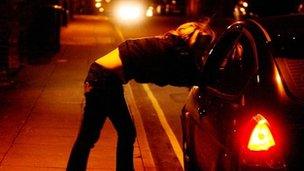Sex trade legislation: How do you protect prostitutes?
- Published

Prostitution is not a crime in the UK although activities around it are
The Scottish Parliament is considering making it an offence to pay for sex, but is it the right way to protect prostitutes and could it work in England?
In the United Kingdom prostitution is not a crime although a number of activities around it such as kerb crawling are.
In England and Wales new laws were introduced under the <link> <caption>Policing and Crime Act 2009</caption> <url href="http://www.legislation.gov.uk/ukpga/2009/26/section/14/enacted" platform="highweb"/> </link> which made it illegal to purchase or attempt to purchase sexual services from a person subjected to force.
But the act did not make paying for sex illegal, which is what is being proposed in Scotland.
Dr Belinda Brooks-Gordon, from the Department of Psychological Sciences, Birkbeck, University of London, has researched and written about the sex industry.
'Make things worse'
She said the Scottish legislation proposal was not supported by any evidence that it would help sex workers.
"It's McCarthyism in the bedroom," she said.
"The prisons are at bursting point so to fill them with people who use prostitutes and to give them a criminal record is lunacy.
"It would be a retrograde step and would make things worse.
"The people this legislation would most harm are the people they are proposing to help."
She said the best way to protect sex workers was to treat violence against them as a hate crime and build a strong relationship between the police and prostitutes so they felt that if they approached them for help their complaint would be taken seriously.
Catherine Stephens is an activist for the International Union of Sex Workers.
Ms Stephens, who has been a sex worker for 11 years, said legislation to make paying for sex illegal did not take into account the consent of those taking part.
She said: "It's not the business of the state to say that it can overrule a woman's consent to sex.
"Organisations that describe themselves as feminist state that our consent is not good enough and the state should have authority over them."
She said the proposed law would make sex work more dangerous as it would push the trade underground.
"We advocate that people who sell sex should have the full support of the law and equal treatment so we can work without being in fear of the police while knowing we can call the police if people commit crimes against us," she said.
Hidden harm
But not everybody objects to the proposal.
Beyond the Streets is a UK charity led by practitioners working with people who they say have been sexually exploited through prostitution.
It has a network of more than 50 grassroots outreach projects which seek to help those wishing to leave the sex trade.
Mark Wakeling, the charity's director, said: "We welcome these proposals as it's important to recognise the hidden harm behind prostitution and to challenge the assumption that there is a human right to purchase sex.
"The proposal made to the Scottish Parliament that would make it an offence to pay for sex has the potential to tackle some of the key issues associated with prostitution - inequality, lack of opportunity, poverty and abuse of vulnerability."
But he added any intervention had to be holistic and include help for women to leave the sex industry and find alternative methods of employment.
Dr Teela Sanders, a reader in sociology at the University of Leeds, has researched the UK sex industry for the last 10 years.
She said criminalisation of either party had only negative consequences.

The Scottish Parliament will consult on the proposal
In a letter to the Scottish Parliament's Justice Committee, she said: "Embarking on such significant changes without safeguards in place around safety and violence could have severe harmful effects.
"The intensive policing of individuals to 'deter' them from sexual behaviour (which is not in and of itself either violent or illegal where two consenting adults have made an agreement) would surely outweigh the effects of any deterrence."
In England and Wales there are currently no plans to revisit laws around prostitution.
A Home Office spokesperson said: "Current laws to protect individuals and communities from the harm of prostitution have a clear focus on tackling exploitation.
"At the same time the law on sexual and violent crime is unequivocal, regardless of whether the victim is involved in prostitution - it is unacceptable and anyone found to be responsible for such crimes will be punished."
In Scotland the proposal will now undergo a period of consultation before it is decided on by the Scottish Parliament.
Whatever the outcome, those who support prostitutes or who work in the sex trade in England will be monitoring the result closely.
- Published19 June 2012
- Published16 May 2012
- Published28 July 2011
- Published28 December 2010